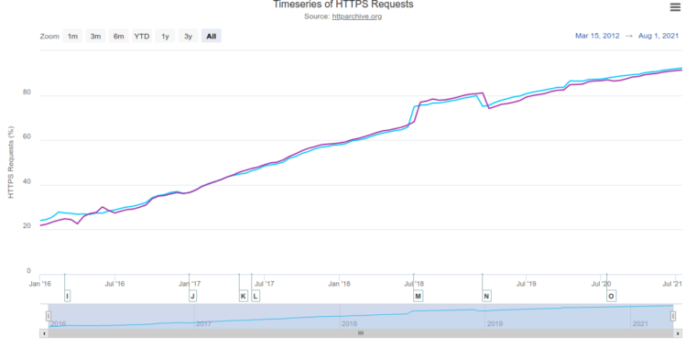Final week, the Digital Frontier Basis introduced that it’s going to deprecate its HTTPS In every single place browser plugin in 2022. Engineering director Alexis Hancock summed it up within the announcement’s personal title: “HTTPS is definitely in every single place.”
The EFF initially launched HTTPS In every single place—a plugin which mechanically upgrades HTTP connections to HTTPS—in 2010 as a stopgap measure for a world that was nonetheless getting accustomed to the thought of encrypting all web-browser site visitors.
When the plugin was new, the vast majority of the Web was served up in plaintext—weak to each snooping and manipulation by any entity which may place itself between a web-browsing person and the online servers they communicated with. Even banking web sites regularly supplied unencrypted connections! Fortunately, the web-encryption panorama has modified dramatically within the 11 years since then.
We are able to get some thought of simply how far the protocol has come by taking a look at HTTP Archive’s State of the Net report. In 2016—six years after HTTPS In every single place first launched—the HTTP Archive recorded encrypted connections for fewer than one website in each 4 it crawled. Within the 5 years since, that quantity has skyrocketed—as of July, the Archive crawls 9 of each 10 websites by way of HTTPS. (Google’s Transparency Report reveals the same development, utilizing information submitted by Chrome customers.)
Though the elevated natural HTTPS adoption influenced the EFF’s choice to deprecate the plugin, it isn’t the one motive. Extra importantly, automated improve from HTTP to HTTPS is now obtainable natively in all 4 main shopper browsers—Microsoft Edge, Apple Safari, Google Chrome, and Mozilla Firefox.
Sadly, Safari remains to be the one mainstream browser to drive HTTPS site visitors by default—which seemingly knowledgeable the EFF’s choice to retire HTTPS In every single place till subsequent yr. Firefox and Chrome supply a local “HTTPS Solely” mode which should be user-enabled, and Edge presents an experimental “Automated HTTPS” as of Edge 92.
If you would like to allow HTTPS Solely / Automated HTTPS natively in your browser of alternative at the moment, we suggest visiting the EFF’s personal announcement, which incorporates each step-by-step directions and animated screenshots for every browser. After enabling your browser’s native HTTPS improve performance, you may safely disable the soon-to-be-deprecated HTTPS In every single place plugin.
Itemizing picture by Rock1997 / Wikipedia


